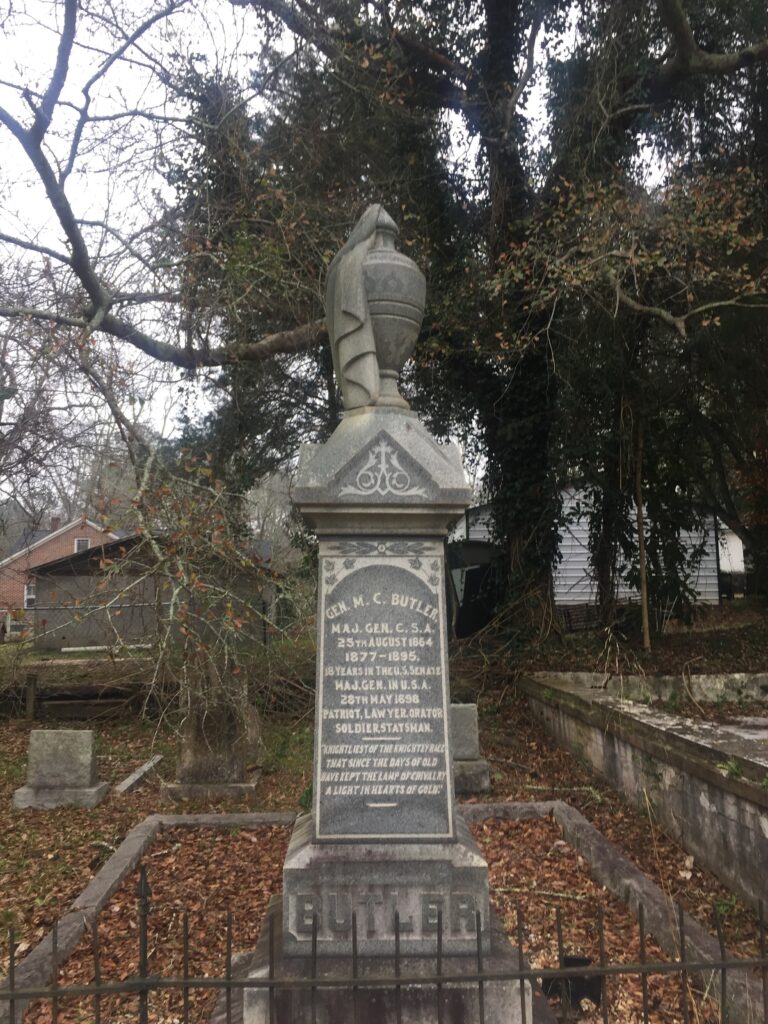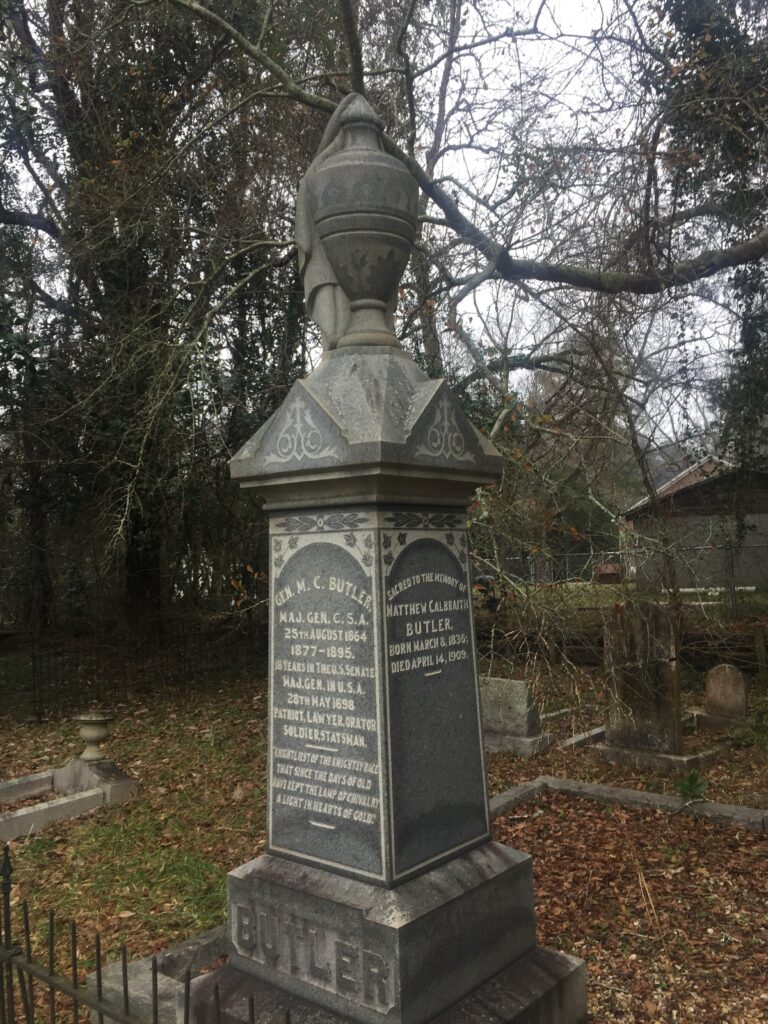Erik Visits an American Grave, Part 1,637
This is the grave of Matthew Butler.


Born in 1838 outside Greenville, South Carolina (the ridiculously named Eagle’s Crag technically), Butler grew up at the peak of the South Carolina slaver elite. His family was pretty old money with lots of political power. Grandpa William was in Congress. They married well too. His mom was the sister of Oliver Hazard Perry and Matthew Perry, the naval officers from Rhode Island. Butler was named for Uncle Matthew. Shortly after his birth, his father joined Congress too. Uncle Andrew was a senator and Uncle Pierce was governor. Inbred, much? Cousin Preston Brooks is who beat the living shit out Charles Sumner on the floor of the Senate in 1856, shortly before dying of dysentery himself.
So this is how Butler grew up. Lots of slaves, lots of radical politics, lots of mouthbreathing. This was not a great time and these South Carolina elites–not only this family but very much this family–led the nation toward dissolution over their fanatical vision of slavery. Of course there was business to be taken care of too. Butler’s father only served one term in Congress before returning home to the plantation business. In fact, in 1848, Matthew joined him out in Arkansas to manage the family’s new plantations out there. Knowing how this worked, I wonder how many slave families they broke up to create those new plantations? A lot, no doubt.
But Arkansas was not a place to educate a young man and so in 1851, Butler’s father sent him back to his uncle in Arkansas to get that classical South Carolina elite education. That was Edgefield Academy, in the home of the South Carolina elite class at this point (they lived upcountry in better weather than where the cotton and rice and indigo were being grown). Then to South Carolina College, today the University of South Carolina. He graduated in 1856, read for the law, passed the bar in 1857, and followed the family tradition into the South Carolina legislature in 1860.
Late in 1860, South Carolina committed treason in defense of slavery. Finally, the dream of Butler and his horrible family came to fruition. Now men like Butler could fight and prove their manhood over those feminized wussy Northerners (this is basically how the South saw the North in 1860 and 1861, determined these weird reformer types would never fight like real men and thus would cave in the face of superior southern manhood) and so he resigned from the statehouse to join the military.
Naturally, Butler was in the Wade Hampton funded Hampton’s Legion, within the Army of Northern Virginia. He rose fast, reaching captain in June 1861 and major a month later. Then in 1862, when the calvary in Hampton’s Legion was merged into the 4th South Carolina Battalion, the soldiers elected Butler colonel.
Butler did take a shot to the foot at Brandy Station in 1863 and it was amputated. Unfortunately, he survived. He didn’t even leave the military. In fact, he was promoted to brigadier general. He still worked under Wade Hampton to the end of the war. He still fought as late as 1865, when he was wounded again, this time relatively mildly, at Bentonville, part of Sherman’s campaign north into North Carolina as he sought to meet up with Grant’s forces and crush Lee once and for all.
One thing the end of slavery did was ruin Butler financially. Now he didn’t have a foot and he didn’t have any of humans to beat and torture into work either. Sad. So he actually had to work and he did, taking his law practice seriously. Once that happened though, it was back to politics and this time he took that more seriously. It goes without saying that Butler was a Democrat and he rose back into power supporting the white supremacy of that time. He reentered the state legislature in 1866. He ran for lieutenant governor in 1870, but lost that race. Still, he and South Carolina whites were just waiting to take back power. So in 1876, Butler led a mob of whites on the Black town of Hamburg. which then murdered the sheriff and executed five men point blank. The mayor of the town issued an arrest warrant for Butler, but who was going to serve it?
Of course all this worked out for Butler, who was sent to the Senate by the state thanks to his service to violent white supremacy. He would stay there for three terms. This was despite, or in fact because, he was known to have threatened to personally murder Black men, even outside of this mob he led. In fact, Harrison Bouey, the minister who would later be involved with getting Black South Carolinians to get out and move to Africa, accused Butler at the hearings over sending him to the Senate that Butler had personally threatened to kill him. But that sure didn’t matter in 1877. Speaking of 1877, part of the deal that Rutherford Hayes made with the South to secure the presidency and end Reconstruction is that he got Butler to promise that the South would respect Black civil rights. Ha ha ha ha ha, yeah………
In fact, one of Butler’s big things in the Senate was pushing a bill that would pay African Americans to leave the nation and move to Africa. That didn’t go anywhere, though Henry McNeal Turner, among others, actually provided support for the idea from the Black community. As a senator though, Butler seems to have been indifferent in quality and other than this idea, the literature barely mentions his time in the Senate.
Butler wasn’t unpopular in South Carolina, but in 1895, the state decided to send Pitchfork Ben Tillman to the Senate instead of a fourth term for Butler. Tillman had the momentum as the younger, more aggressive white supremacist. And when has that not appealed to South Carolina whites, to the present? Somewhat amusingly I suppose, Butler attempted to use the Reconstruction-era voting rights laws to get the election he lost thrown out, though the only difference between Butler and Tillman on the actual issue of Black voting rights was that the latter was even more inclined to violence than the former. It didn’t work. Butler had also been one of those southern politicians decrying the rise of populist-oriented third parties such as the Greenbackers in the 1880s and early 1890s as treason to the white race, saying publicly that one had to be a radical for the Democratic Party.
After leaving the Senate, Butler stayed in Washington and practiced law. He also volunteered for the imperialist war against Spain and was appointed major general of volunteers. Mostly what he did was supervise the moving of American troops out of Cuba after that victory. Later, Butler spent a few years in Mexico. He had gotten involved with a mining company that had operations there and supervised it onsite. He also was heavily involved in the Confederate nostalgia movement and was president of the Southern Historical Society in 1903.
Butler came back to Washington in 1906 after remarrying (his first wife had died). He died there in 1909, at the age of 73.
Matthew Butler is buried in Edgefield Village Cemetery, Edgefield, South Carolina.
If you would like this series to visit other senators sent to Washington in the 1876-77 cycle, you can donate to cover the required expenses here. Samuel Kirkwood is in Iowa City and Alvin Saunders is in Omaha. Previous posts in this series are archived here and here.


